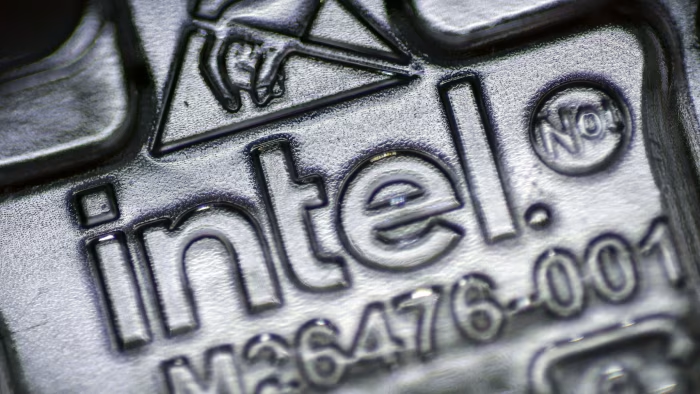Unlock the White House Watch newsletter for free
Your guide to what Trump’s second term means for Washington, business and the world
The US will take a 10 per cent stake in struggling chipmaker Intel as it seeks to strengthen America’s semiconductor industry, in the latest corporate intervention by Donald Trump’s administration.
Intel late on Friday said the US government would make an $8.9bn equity investment, funded by federal grants that had been previously agreed under the 2022 Chips Act but not allocated. The pact will hand Washington a roughly 9.9 per cent stake in the group.
Trump said on his Truth Social Platform on Friday: “This is a great Deal for America and, also, a great Deal for INTEL. Building leading edge Semiconductors and Chips, which is what INTEL does, is fundamental to the future of our Nation.”
The announcement is the president’s latest move towards a more interventionist approach to corporate America, one that edges closer to 1960s European state capitalism than US free-market orthodoxy.
Intel said the government would purchase the shares at $20.47 each, below Friday’s closing price of $24.80, but about the level where they traded early in August. Intel’s board had approved the deal, which does not need shareholder approval, according to people familiar with the matter.
The US will also receive a five-year warrant, which allows it to purchase an additional 5 per cent of the group at $20 a share. The warrant will only come good if Intel jettisons majority ownership of its foundry business, which makes chips for other companies.
Some investors have pushed for Intel to cut its losses and fully divest its manufacturing unit. Intel chief Lip-Bu Tan, who took the reins in March, has so far remained committed to keeping it, albeit with a warning that he could withdraw from the most advanced chipmaking if he was unable to land big customers.
Tan had previously held talks with SoftBank’s billionaire founder Masayoshi Son about potentially purchasing the foundry business, the Financial Times reported this week. Japan-based SoftBank on Monday said it would purchase $2bn worth of Intel shares.
Tan said on Friday that Intel was “deeply committed to ensuring the world’s most advanced technologies are American made”.
The government’s ownership in Intel will be passive, with no board representation or other governance rights. The US also agreed to vote in support of the board on any matters which need shareholder approval.
Intel’s shares jumped 5.5 per cent on Friday.
The pact will relieve pressure on Intel to earn the allocation of its grants under the Chips Act, which are assigned based on a company hitting certain construction milestones.
Tan’s recent announcement that Intel was slowing its construction plans, including in Ohio, has raised questions about whether it will receive all of the $10.9bn in funding under the original agreement with the Biden administration, finalised in December.
Just met with President Trump to announce a historic agreement: the U.S. government is investing $8.9B in @Intel to boost American semiconductor leadership.
I’m excited about the work ahead to ensure the most advanced silicon technology and computing products of the future are… pic.twitter.com/8PUcJyiNJu
— Lip-Bu Tan (@LipBuTan1) August 22, 2025
Trump added: “We do a lot of deals like that: I’ll do more of them.”
The Intel pact follows arrangements struck with Nvidia and Advanced Micro Devices, which were allowed to sell more advanced artificial intelligence processors in China on the condition they channel part of the resulting revenues back to Washington.
Separately, earlier this year, the White House also claimed a so-called golden share in US Steel as a precondition for clearing its takeover by Japan’s Nippon Steel, handing the government veto power over strategic corporate decisions.
Foreign chipmakers such as Taiwan Semiconductor Manufacturing Company and Samsung, which have also been approved for billions of dollars in federal grants, were unlikely to be as receptive as Intel to renegotiating their deals into equity stakes, industry insiders told the Financial Times.
TSMC’s $6.6bn in federal manufacturing grants equates to a minuscule share of its $1tn market capitalisation. The company has completed one advanced chip manufacturing facility in Arizona, with two more under way.
Recommended
In March it announced plans for three further chipmaking plants as part of an additional $100bn investment plan agreed with the administration. It is producing chips for the likes of Apple and Nvidia in the US.
Intel, by contrast, has struggled with securing external customers for its manufacturing operations, and its chipmaking business is losing billions of dollars. It posted an operating loss of $13bn in 2024.



